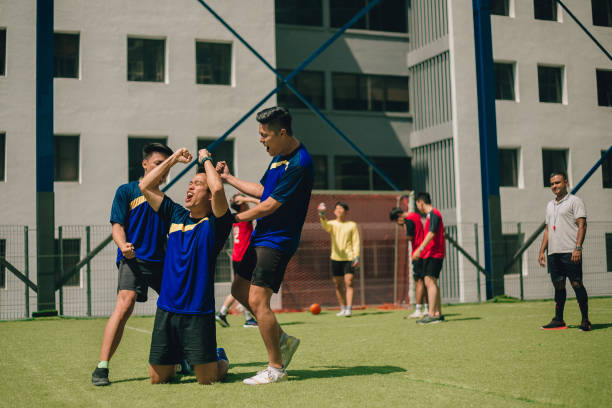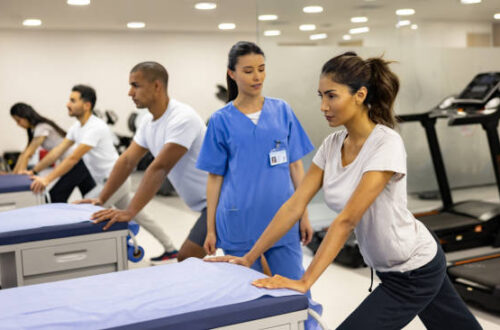Staying fit doesn’t have to mean spending hours in the gym. For students, sports are a fun, social, and effective way to stay active while balancing academics. From boosting energy levels to improving focus, playing the right sports can make a big difference in both health and student life. In this article, we’ll explore the top 10 student-friendly sports that are easy to play, budget-friendly, and perfect for building fitness while having fun.
Many students struggle to stay active with a busy school schedule. Still, exercise is vital for physical and mental health. The best way to stay fit is by choosing a sport that is accessible, affordable, and fun. Luckily, many sports are perfect for a student’s budget and lifestyle.
1. Running 🏃
Contents
- 1 1. Running 🏃
- 2 2. Basketball 🏀
- 3 3. Volleyball 🏐
- 4 4. Swimming 🏊♀️
- 5 5. Badminton 🏸
- 6 6. Hiking and Walking 🥾
- 7 7. Soccer (Football) ⚽
- 8 8. Martial Arts 🥋
- 9 9. Yoga 🧘♀️
- 10 10. Table Tennis (Ping-Pong) 🏓
- 11 Beyond the Game: The Academic and Mental Health Benefits of Sports
- 12 Making It Happen: A Student’s Guide to Staying Active
- 13 What’s Next? From Student-Friendly to a Lifelong Habit
Why it’s a great choice: Running is arguably the most accessible and budget-friendly sport there is. All you need is a good pair of sneakers and the motivation to get out the door. It’s a fantastic way to clear your head after a long day of classes and a great cardio workout. Running is beautiful because it’s simple and flexible. You can sprint for a quick HIIT workout or enjoy a long, slow run to boost your endurance. Both are excellent for your heart and lungs.
Benefits: Running strengthens your heart and lungs. It boosts endurance and greatly cuts stress. It also helps with weight management. Beyond the physical, the mental benefits are immense. The repetitive motion can be meditative, and being outdoors provides a sense of peace that is a perfect antidote to the pressure of student life. You can run solo for a peaceful workout or join a campus running club to meet new people and stay accountable.
How to start: Most campuses have a running track or scenic trails nearby. You can download a free app to track your runs and find a running buddy to hold you accountable. Start slow with a combination of walking and running, and gradually increase your distance.
2. Basketball 🏀
Why it’s a great choice: A game of pickup basketball is a fun, social, and intense workout. Most college campuses have free indoor or outdoor courts, and you don’t even need a full team—just a few friends and one ball. It’s a great way to relieve stress and improve your skills. Basketball is a great full-body workout. It includes quick sprints, jumps, and explosive moves. This keeps you active and engaged from start to finish.
Benefits: Basketball is a full-body workout. It boosts cardiovascular health, agility, hand-eye coordination, and speed. It’s a dynamic sport that teaches you teamwork and communication in a fast-paced environment. The constant back-and-forth action builds strategic thinking and problem-solving skills quickly. These skills are valuable in every part of life.
How to start: Grab a few friends and find a court. Many schools have intramural leagues, which are a perfect way to join a team without a huge time commitment. It’s a low-pressure way to have fun and meet new friends.
3. Volleyball 🏐
Why it’s a great choice: Whether you’re playing indoors or on a beach, volleyball is a very social sport that’s easy to learn. The equipment is minimal, and a game can be played with just a few people. It’s a fun and active way to spend time with friends. Volleyball is a strategic game that requires you to think quickly and react fast.
Benefits: Volleyball enhances your muscle strength, agility, and reflexes. It’s a full-body workout that can be both high-energy and low-impact. The constant jumping, diving, and reaching help to strengthen your core and improve flexibility. It fosters great teamwork and a positive, collaborative atmosphere. You need to count on your teammates to succeed.
How to start: Campus gyms often have open courts. Check your university’s recreation center schedule for open play times or sign up for an intramural team.
4. Swimming 🏊♀️
Why it’s a great choice: If your campus has a pool, swimming is a no-cost, full-body workout that’s easy on the joints. It’s an excellent way to get fit and can be both a high-intensity workout and a relaxing, stress-relieving activity. Swimming works all major muscle groups while being easy on your joints. This makes it great for recovery or for anyone with injuries.
Benefits: Swimming builds incredible muscle strength and endurance. It improves lung capacity and is a great option for recovery or for those with injuries, as it is a low-impact sport. The feeling of being in the water can be incredibly calming, and it’s a great way to unplug from the constant demands of technology.
How to start: Check the hours of your campus pool. Swimming often requires no sign-up and is a great activity to do in between classes or at the end of the day to unwind.
5. Badminton 🏸
Why it’s a great choice: Badminton is a fast-paced, high-energy game that’s perfect for a small space. It can be played indoors, so it’s a great option no matter the weather. All you need is a racket, a shuttlecock, and a partner. It’s a competitive but friendly sport that’s easy to pick up but hard to master.
Benefits: Badminton is fantastic for improving your reflexes, coordination, and stamina. It’s also an excellent cardio workout that can burn a lot of calories. It’s a fun, social sport that’s easy to pick up but hard to master, offering a great balance of physical and mental engagement.
How to start: Many university gyms have courts available for free. You can often rent rackets and shuttlecocks or buy your own inexpensive set.
6. Hiking and Walking 🥾
Why it’s a great choice: This is an amazing way to explore your surroundings and get a workout in at the same time. Hiking is a low-cost activity that gets you outside and away from the stress of school. You can hike in a group for safety and social interaction, or go alone for a peaceful, meditative experience.
Benefits: Hiking is great for building leg strength, improving balance, and boosting your cardiovascular health. Being in nature offers great mental health benefits. It can help reduce anxiety, lift your mood, and spark creativity. It’s a perfect way to break up your routine and get a fresh perspective.
How to start: Find local trails or parks. There are often campus clubs dedicated to hiking and outdoor adventure, which is a great way to find new places and friends.
7. Soccer (Football) ⚽
Why it’s a great choice: Soccer is a universally loved team sport that is great for fitness. All you really need is a ball and a patch of grass. A casual game can be a fantastic way to meet people from different backgrounds and cultures, as it is one of the most widely played sports in the world.
Benefits: Soccer is an intense cardiovascular workout. It builds endurance and stamina and improves agility. The fast-paced, fluid nature of the game also helps you develop strategic thinking and teamwork. It’s a great way to improve your speed, agility, and quick decision-making skills in a competitive and fun environment.
How to start: Look for a pickup game on a campus field. Intramural leagues are also a popular way to play in a more organized setting.
8. Martial Arts 🥋
Why it’s a great choice: Martial arts like Karate, Taekwondo, or Judo are about more than just self-defense. They are a holistic workout for your mind and body. Many university clubs provide beginner classes. The community is usually friendly and supportive.
Benefits: Martial arts improve your strength, flexibility, and coordination. They also build discipline, focus, and confidence. It’s a great way to relieve stress and channel your energy into a positive and productive practice. Practicing forms and techniques regularly helps boost memory and concentration. These skills are important for academic success.
How to start: Check out your school’s recreation or club sports website. They often have groups dedicated to different forms of martial arts, and the first class is often free.
9. Yoga 🧘♀️
Why it’s a great choice: Yoga is a perfect activity for a student’s demanding life. It mixes physical exercise with mental relaxation. This helps you find balance during the chaos of exams and assignments. It can be done in your dorm room and requires no equipment other than a mat, which you can often find affordably.
Benefits: Yoga improves flexibility, strength, and balance. It’s also a powerful tool for reducing stress, improving focus, and calming your mind. The breathing techniques and poses help with anxiety and better sleep. You can choose different styles like Vinyasa for a more athletic workout or Hatha for a slower, more meditative practice.
How to start: Many campus gyms offer free or low-cost yoga classes. You can also find thousands of free tutorials online for all skill levels.
10. Table Tennis (Ping-Pong) 🏓
Why it’s a great choice: Table tennis is a surprisingly intense and fast-paced game. It’s perfect for a quick break and can be played indoors, making it great for any time of year. All you need is a paddle and a ball, and most campus recreation centers have tables available.
Benefits: This sport is excellent for your reflexes, hand-eye coordination, and mental alertness. It’s a low-impact workout that’s also a lot of fun, making it an easy way to stay active without a lot of effort. It’s a competitive but friendly activity that’s perfect for a quick study break or a social gathering.
Beyond the Game: The Academic and Mental Health Benefits of Sports
The physical benefits of sports are clear. But their effects on academic performance and overall well-being are often missed. Staying active can be the single most effective way to improve your student life.
The Brain-Body Connection: A Performance Boost
Exercise is like a supercharger for your brain. When you engage in physical activity, your heart rate increases, which boosts blood flow to your brain. Increased blood flow brings more oxygen and nutrients. This can boost your memory, focus, and problem-solving skills. Think of it as a natural way to optimize your brain for studying. Regular exercise boosts brain chemicals like endorphins, dopamine, and serotonin. These help lift your mood and sharpen your thinking. This means that a good workout can make you more efficient and productive when you sit down to study.
A Powerful Stress Reliever and Mood Booster
Student life is full of stress, from high-stakes exams to demanding deadlines. Physical activity is a powerful way to manage this pressure. When you exercise, your body naturally produces stress-reducing chemicals. Engaging in a sport, whether it’s a team game or a solo run, gives you a healthy outlet to release tension and frustration. It helps to clear your mind and provides a much-needed break from the constant mental load of schoolwork. The sense of accomplishment you get from a good workout or a win in a game can also significantly boost your confidence and self-esteem.
Building Life Skills on the Court
Sports teach you more than just how to throw a ball or hit a shuttlecock. They teach you invaluable life skills that will help you succeed in your career and personal life.
- Teamwork: In team sports, you learn to work with others. You communicate well and depend on your teammates to reach a shared goal.
- Discipline: Sticking to a practice schedule helps you grow your skills. This builds discipline and dedication. You can use these traits in your studies and future career.
- Resilience: Learning to bounce back from a tough loss or a bad performance teaches you resilience and mental toughness. It shows you how to handle setbacks and keep pushing forward.
- Time Management: Fitting a sport into a busy schedule forces you to become better at managing your time and prioritizing your tasks.
Making It Happen: A Student’s Guide to Staying Active
Finding the time and motivation to be active can be tough, but with a little planning, it’s easier than you think.
Finding the Right Time
Don’t wait for a free afternoon to magically appear. Treat your workout like a class and schedule it into your week. A great time to be active is in the morning to start your day with energy, or right after class to de-stress. You can also break up long study sessions with a quick 15-20 minute walk to recharge your brain.
No Gym, No Problem
You don’t need a fancy gym to get a great workout. You can do simple exercises in your dorm room using just your body weight, such as pushups, squats, and planks. Use the stairs in your building for a quick cardio blast. Instead of taking the bus, walk or bike to class. These small changes can add up to a big difference in your fitness.
Joining the Community: The Power of Campus Rec
Most universities have fantastic recreation centers that are included in your student fees. Make the most of them!
- Intramural Sports: These are organized leagues for students of all skill levels. It’s a fun way to play a sport without the high-pressure commitment of a varsity team.
- **Club Sports:** These are student-led groups focused on specific sports. They usually compete at a higher level than intramurals, but not as intensely as varsity teams.
- Free Fitness Classes: Your campus gym likely offers free classes, from yoga and spin to circuit training. It’s a great way to try something new and meet people.
What’s Next? From Student-Friendly to a Lifelong Habit
The habits you build in college can last a lifetime. The most important thing is to find an activity you truly enjoy. When exercise feels like a chore, you’ll find reasons to skip it. When it feels like a fun break from your routine, you’ll look forward to it. Whether it’s a pickup game of basketball or a peaceful hike, make a commitment to your health now, and you’ll reap the benefits for years to come.
Frequently Asked Questions
Q1: What is intramural sports?
Intramural sports are leagues or tournaments organized within a single university. They are a great way for students to play a sport without the high-level commitment of a varsity team. They’re all about having fun and meeting people.
Q2: Do I have to be good at sports to join a team?
Absolutely not! Intramural and club sports are usually open to all skill levels. It’s about participation and having fun, not about being an all-star.
Q3: How can sports help me with my academics?
Regular exercise is proven to improve blood flow to the brain, which can boost your memory, focus, and problem-solving skills. Taking a break to play a sport can also reduce stress and prevent burnout, helping you perform better in your studies.
Q4: What if I get injured?
If you get injured, the most important thing is to listen to your body and rest. Don’t try to “push through the pain.” Most college campuses have a student health center that can provide a diagnosis and treatment plan. You can also try a low-impact sport like swimming to stay active while you recover.
Q5: How do I motivate myself on a bad day?
Motivation comes and goes. The key is to build a habit. On a day when you don’t feel like working out, commit to just 15 minutes. Often, once you start, you’ll want to keep going. Also, remember your “why”—are you doing it to relieve stress, sleep better, or just feel more energized? Keep that reason in mind.





